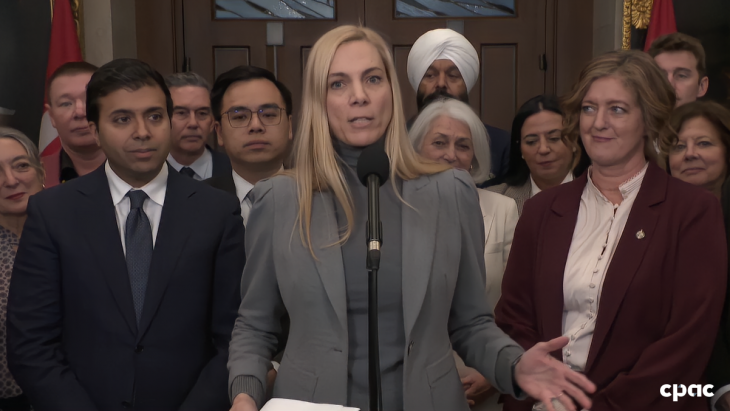
By Christopher Guly
OTTAWA-The federal government will provide Telefilm Canada with $100 million in funding for two years, beginning in the upcoming fiscal year 2024-25, Canadian Heritage Minister Pascale St-Onge announced on Parliament Hill on Wednesday.
Telefilm previously received $105 million over three years from the 2021 federal budget that St-Onge said resulted in such feature films as BlackBerry, about Research in Motion’s signature mobile device, and Bones of Crows, about Canada’s residential school system.
The new funding, she added, would support between 40 and 60 productions annually and “put food in our minds – in our thoughts and in our hearts collectively – [by] watching Canadian stories” as well as “food on the table for more than 180,000 workers in the movie and television sector.”
“So it’s good for the economy and good for those families that will know that they have jobs for the coming years,” said St-Onge.
In a news release, Canadian Heritage said that the $100 million will ensure that Telefilm Canada “can pursue the modernization of its suite of programs” and “continue to provide better access to a diverse range of creators and producers.”
The new money also ensures that Telefilm “maintains initiatives to improve support for creators from equity-deserving communities,” the department said.
In a statement, Telefilm executive director and CEO Julie Roy welcomed the federal government’s “timely and essential contribution to our sector, especially as the industry is gaining momentum and mobilizing its efforts to be competitive and viable.”
She noted that there have been calls for further funding for Telefilm from within the industry.
The Association québécoise de la production médiatique (AQPM) – the Quebec producers association – said in a statement that it was “relieved” that the federal Liberals kept their 2021 election commitment to maintain Telefilm funding at $50 million annually.
Without this renewal, which as AQPM said arrived “one minute to midnight” as the last basket of funding was set to end and “the production of dozens of works would have been jeopardized while Quebec cinema is currently experiencing incredible growth.”
At the start of its annual Prime Time conference in Ottawa, the Canadian Media Producers Association (CMPA) said in a statement that the new $100 investment “will ensure Canadian feature film producers can continue to develop and create world-class content for audiences at home and around the world.”
CMPA president and CEO Reynolds Mastin said that “the announcement comes at a critical time for the industry; creators are emerging from a prolonged period of disruption. With today’s announcement, the industry now stands on solid footing and is well positioned to thrive in the years ahead.”
He also highlighted the investment in allowing “Telefilm to maintain initiatives for creators from equity-deserving communities” and hoped that the government would soon follow with an announcement “confirming the renewal of funding for the Indigenous Screen Office [ISO].”
In 2021, the ISO received $43 million in federal funding over three years, which expires on March 31, but was allocated no money in last year’s federal budget.
On Jan. 24, the ISO sent an open letter to St-Onge and federal Finance Minister Chrystia Freeland, said that now “is the time to invest in its growth, rather than being set up for failure by this government.”
“Indigenous storytellers and production companies across the country have made great strides in the industry since the ISO was created six years ago but will soon face precarity without a renewed commitment from the government,” said the letter signed by 289 members of the Indigenous and Canadian screen industry.
“We are calling on the government to renew its funding to the ISO, so it can continue its vital support to the Indigenous screen sector, a key component to the Government of Canada’s stated commitments to reconciliation under UNDRIP [United Nations Declaration on the Rights of Indigenous Peoples] and the TRC [Truth and Reconciliation Commission] Calls to Action.”
The ISO said that since receiving its last federal funding allocation, it has “delivered over $24.6 million to over 320 First Nations, Inuit and Métis recipients across Canada” and that more than 88% of its budget has been “delivered directly to Indigenous-owned companies and projects.”
On Wednesday, the Canada Media Fund (CMF) released its Creating Change report that evaluated the impact of Canadian Heritage funding to advance CMF equity, diversity and inclusion (EDI) initiatives.
The CMF said that the $60 million it received from the 2021 federal budget, which was allocated in $20-million installments over the past three years, “has been a key driver in advancing EDI across Canada’s audiovisual sector.”
However, as the CMF noted, “without renewal in the 2024 federal budget, this pivotal funding, which has underpinned significant sectoral growth, will come to an end on March 31, 2024.”
Screenshot of Heritage Minister Pascale St. Onge.



